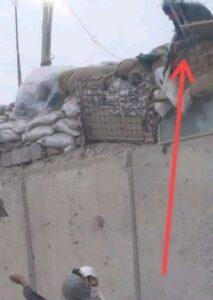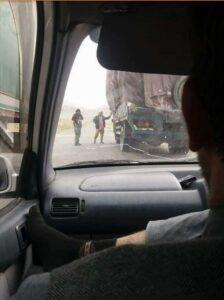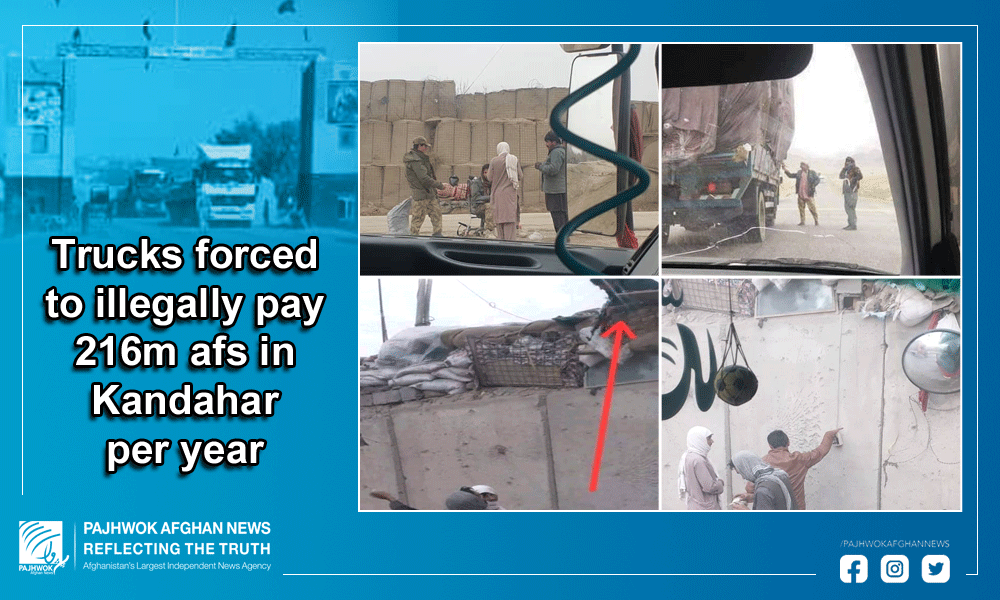KANDAHAR CITY (Pajhwok): About 600,000 afghanis are being taken illegally from cargo trucks every day on highways in southern Kandahar province, investigations by Pajhwok Afghan News show.
According to Pajhwok’s findings, police, transport officials and traffic police take money from truck drivers and the drivers often complain about this at police checkpoints along the highway route.
The Kabul-Herat highway passes through Kandahar, with hundreds of trucks plying the route every day.
The report seeks to investigate illegal payments in Kandahar, interviewing dozens of drivers and sharing their videos and photos with Pajhwok.
Drivers: we are beaten if refuse to pay
Truck drivers on the Kabul-Kandahar highway say police not only extort money from them illegally, but also insult them, beat them and even open fire at them if they don’t pay.
Lali is a driver who takes commercial goods from Herat’s Torgundai to Kandahar, Kabul and other provinces.
He told Pajhwok: “Every checkpoint on the highway from Herat demands money. In Mir Dawod, Farah Road, Shindand, Delaram, Greshk, Yakhchal, SanginDorahi, Maiwand, Zhari, Jigdalak, Norak, Janda, Krosai and many other areas police extort us.”
He said not a fixed amount of money was demanded by police but each driver was charged between 500afs to 5,000afs and even 10,000 afs.
He added that transport officials at the ports were taking money from them and traffic officers in cities charge them, and demanding money from them.
According to him, only Afghan National Army (ANA) forces do not demand money from them and do nor harass them, so security of the road should be handed over to ANA troops.
Mohammad Sabir, another driver, said police at security checkpoints demanded money from him and sometimes stopped him for hours.
He said: “Every check-post demands money and says you love your mother or money? or wife? He pays the money to maintain dignity.
Abdul Rahman, another driver, showed some pictures and videos to Pajhwok, in which drivers were forced to pay at security checkpoints.
He said some security check-posts had hanged jerry cans in which money was put and in some areas the drivers had to stop and take the money to security checkpoint on the hill.
According to him, the Taliban also demand money from them, but the receipt is accepted all the way and no money is taken from the drivers elsewhere, but police have set up so-called customs posts all the way and take money from them.
HjiNiaz Mohammad, another driver who transports gas from Herat in his tanker said he had to pay police out of fear because if the police opened fire and his car could catch fire.
He said a police checkpoint in the Zheri district on the Kandahar-Herat road charged drivers from 100-150 afghanis, check-post in the Maiwand district charged 200 to 300 afghanis, there was another check-post in Maiwand district which charges 5,000 to 20,000 rupees.
In Malang Kariz area one check-post charges 200, another 300, in Lashkargah Dorahi 5-4 check-points are situated and each charges 500 afghanis.
According to him, hundreds of vehicles travel on the road every day, with police receiving thousands of afghanis a day illegally.
Provincial council: police involved in charging illegal money
NimatullahWafa, a member of the Kandahar provincial council, also said that police were illegally taking money from trucks on highways. He said police leadership itself was involved in the illegal practice.
He told Pajhwok: “Obviously, the issue belongs to the police leadership. Professional, law-abiding police will never extort people. Unfortunately, nothing had been done in this regard to address the issue,” he said.
Wafa said it was difficult to prevent police from looting drivers unless there was a reward and punishment system and the law was properly enforced.
Gul Ahmad Kamin, a member of the Wolesi Jirga for Kandahar, said unfortunately drivers were being mistreated on highways and police illegally took money from them in the name of transport fee. He acknowledged that even drivers lost their lives for not paying the money.
However, he said he had started talks with relevant authorities to resolve the issue.
What officials say?
Meanwhile, Kandahar police chief Brig. Gen. Farid Ahmad Mashal, said police in the province did not charge drivers. He assured the drivers that they would not be charged on highways in the province.
Mashal told Pajhwok that areas along highways belonging to the Kandahar police headquarters and no one reserved the right to create problems for drivers or take money from them illegally.
He promised serious measures would be taken to solve the problems of drivers. He asked the representatives of transport companies and drivers to contact them through special numbers in case of any problem on highways.
SediqullahHakimi, Kandahar transport director, said 11 months ago, former minister Yama Shams had stopped collecting revenue from trucks at ports and decided that the revenue should be collected through a specific system at customs offices.
He said the following decision, the Ministry of Transportation did not meet the revenue target and incurred a deficit of 1.5 billion afghanis.
According to him, on this basis, the new Minister of Transport decided to collect the revenue at ports as before and sent a letter in this regard to all the departments in May 2020.
He added when they started collecting internal revenue from vehicles, the drivers went on strike while they could neither collect nor stop the revenue on their own.
According to him, another letter was issued recently by the ministry concerned asking the departments to stop collecting revenue until it reaches an agreement with drivers.
Bahir Ahmad, the governor’s spokesman, told Pajhwok the provincial government had taken a fresh step to crack down on corruption and extortion.
He cited, for instance, the manager of BaghPul scales in Kandahar and two computer workers who had recently been arrested in connection with corruption and illegally taking money from trucks.
He said the arrests came after the governor made a surprise visit to the scales belonging to the Public Works Department late at night following complaints from residents, during which a man was arrested who was illegally charging truck drivers.
He said the detainee had been investigated by NDS, and he had confessed that Abdul Rassoul, the manager of BaghPul scales and two computer workers, Habibullah and Ahmadullah Agha, were involved in extortion.
Ahmadi said the detainees’ cases had been sent to the Attorney General Office, which would then investigate and bring to justice all these involved in money extortion.
However, some days ago, transporters across the country went on strike for two weeks in protest against police harassment and extortion.
Interior Minister Massoud Andarabi, who visited Kandahar a few days ago, personally met the drivers on highways and listened to their complaints.
He said dozens of police officers had been arrested so far and referred to the AGO.
Outcome:
Kandahar is a province in the south of the country and the Heart-Kabul highway, which is 1,062 kilometers long, passes through the province.
Though drivers’ association officials say they are charged on the entire route, but police only report charges taken in cities in Kandahar province.
Haji Niamatullah Alokozai, deputy head of the Kandahar drivers’ association, said that on average about 300 trucks travel on Kandahar-Herat highway, also passing through Nimroz, Farah and Helmand provinces every day.
On this account, if an average 2,000 afghanis are taken from each truck per day, it becomes 600,000 afghanis per day and 18 million afs per month.
This report has been produced by Pajhwok and financially supported by UNDP and Denmark.
Sa/ma







GET IN TOUCH
NEWSLETTER
SUGGEST A STORY
PAJHWOK MOBILE APP